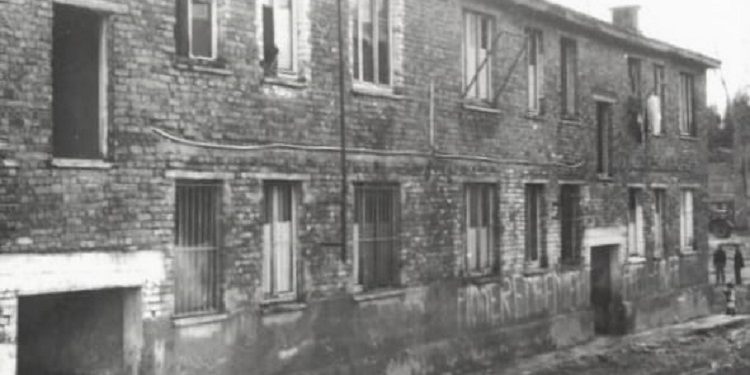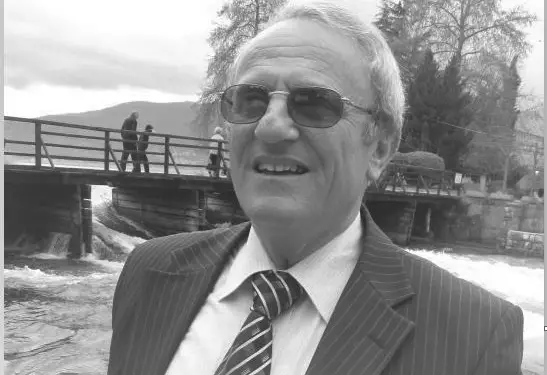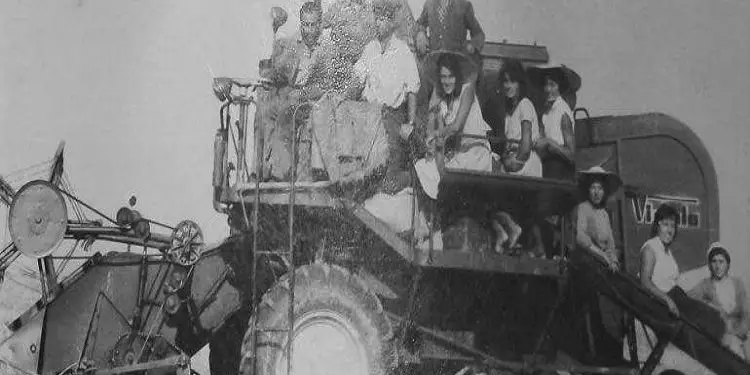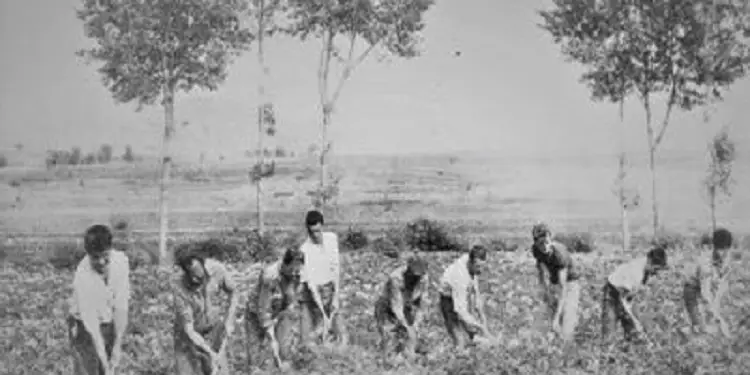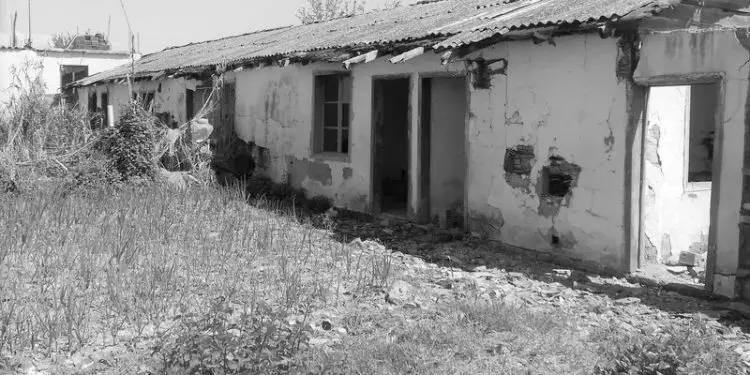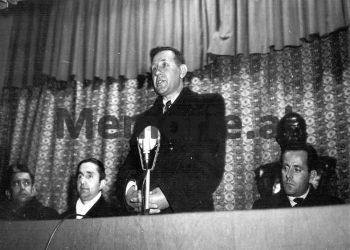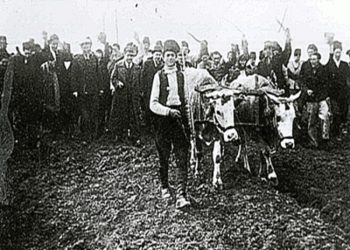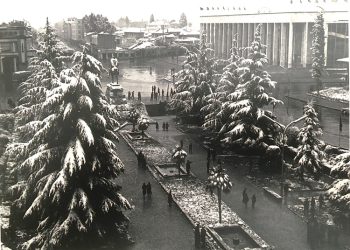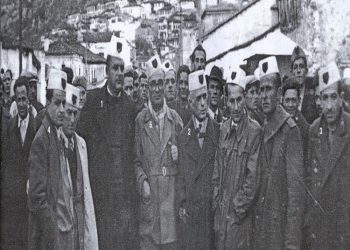From Shpendi Topollaj
Memorie.al / The road to Fllaka were indeed a straight bullet, but the endless potholes reminded you of the bombings of the war. In order to get there, you had to do the calculations well, as not only the guts from the crushing came to your mouth, but you also had to endure the insults of the drivers who got angry when they saw that their engine and tires were being damaged. The town of Fllaka itself (we can call it that), was a dry place and everything was desperate for water. Drinking water was hard to find there. The few wells that held it, stinking and green as it was, dried up completely during the summer. Unfed chickens, the whole day where they didn’t come in, are cackling with their mouths open. And the dogs, mostly with three legs each, sat in the shade of the fig tree that no one had seen the seeds of and did not feel. A grumpy donkey, with fallen hair, motionless and thoughtful, you would always find him on some dung, in the sector offices, almost wanting to complain about some injustice that had been done to him.
Some children nearby were playing with a ball of cloth in the dust and shouting at the top of their heads. The monotonous croaking of frogs could be heard in the roadside canals, choked with brambles and dry grass. During the day, the flies and when the evening fell and the mosquitoes never left people alone with their buzzing and biting.
And always, in the center, in front of the club where there was only surrogate coffee, some cognac bottle with a yellow label and some cookies called gears, your eye would catch Seit, a middle-aged man, unshaven and uncut who was never heard of in was stupid or smart.
That he, after appearing with that military jacket that he never took off from his body, both in winter and in summer, said some things that even those who thought they were who they were, did not dare to say them. The sea was a couple of kilometers away, but people did not have time to go there to make a beach. The many jobs on the farm exhausted them so much that they didn’t think about it.
Here, the government had chosen this country to send some internees. Ademi, a thin man who had once fought with the fascists, had this fate, but then, who remembered that he had a brother who escaped before the liberation. Adam had submitted to fate and in this cursed place, he had built, as he could, his life. He had married the daughter of another man like him, who had been there for years, alone, because he had been rich. That this was not without importance; the power was now held by the proletarians, that is, the ripped ass.
And the more you knocked, the more they respected you. They did not see the trouble that had taken them and the misery that had conquered them, but they lied to themselves that their day had come and were happy that they had shown the bourgeois the place. And, just like that, with empty stomachs as they were, again, where did they find all that zeal, to blacken their lives, even worse. They saw them as enemies and not only did they not step on their door, but they also barely gave them a meal. For Adam, this was unbearable. That in the end they were all poor, but the contempt was heavy.
Even when he sometimes entered the club, as if to exchange some words, he still felt bad, that no one approached him. What was left, except to laugh at Seiti and laugh out loud at his words that he was sure, that he did not take anyone for granted? He would return home bored and look for a reason to be busy with his wife, but as he spent a while turning the newspaper in his hands that they did not forget to always bring at the same hour, he remembered that it was not her fault.
Then, with that newspaper, he would go to the threshold, hoping that the passers-by would see that he was reading the party’s press and would think that, after all, this is ours. But it was not said. They didn’t even look at him or that newspaper and didn’t ask him about what was written in it. Even the children felt the coldness, and he was tormented by the thought that he was the reason they were despised, even at school. Boll was taught by his son, Ardi, but none of the teachers dared to put his picture on the honor board.
One Sunday, he took the road to Durrës. As far as where he could get on the city bus, he decided to go with his junk bike, because he waited in vain; cars rarely passed there on weekdays and no longer on holidays. As he walked for half an hour, he noticed that a small car was coming in front of him, from what they called GAZ – 69.
It was visible from afar because it raised a dense cloud of dust. He realized it must be someone important, so instinctively, he stopped. He took the bike by the hand and moved aside. When the car approached him, he stopped and from the open window an officer, he in his fifties, after greeting him, asked him:
– “Where does it go to the state reserve”?
Adam, a little confused, since he recognized that officer, he also asked: “Comrade Dane”?
– “Yes. Where do you know me?!
– “I am from your village, son of Teme. Then, we were partisans together. Do you remember? You were a battalion commander. In the battle of the Tabernacle, we were in the same position. When that gun cracked, we were both killed.”
– “Where did you get Adam? How long have we been without seeing each other? Then, what do we do here? And when you don’t expect the other…?!
Dania said these words and how she opened the car door, got out and hugged her war friend.
– “I am with the Minister of the Interior, Comrade Kadri”, – he explained.
In the meantime, the minister extended his hand and Adam squeezed it tightly, saying: – “I’m glad.” I am very happy”.
And happy, he added: – “Well, I will tell you, order us from the house. With friend Dane, we haven’t seen each other in who knows how many years. Come on…! With what we have. Thank goodness we have plenty of chickens”.
When he heard about village chickens, the minister immediately thought: – “Yes, Dania, she has it in hand”.
And Dania, who apparently wanted so much, cut him off right then and there: “We will definitely come.” We have a lot to talk about. This is a life…”! “Do you have the bike”?
– “Bicycles do not disrupt work. I leave the corn to these guards and they bring it to me for dinner”
That’s what Ademi did, and when he told the curious guards that he was coming home, the Minister of the Interior himself, friend Kadri, got into the car. When they arrived in Fllaka, after ten minutes, he looked around, saw no one, and went to his friends from his house.
– “Woman! – He called at the door loudly, so that everyone could hear him. – It turns out that we have a guest, the Minister of the Interior himself, comrade Kadri. The wife, who did not manage to take off her apron, went to the door scared and called out:
– “Welcome to us! Welcome to us”!
Adam, now that he had collected himself, began to give orders:
– “Soon we don’t have time. Start slaughtering the chickens. Do you have the fire lit?
– “In half an hour, everything will be ready, don’t worry, man.”
– “Involve the children as well”.
– “I know that job. You see, chat to the guests. Here I am bringing the brandy.”
Adam, even though he was sure that she would bring out the best brandy, again, he did not sit down without telling her:
– “He was boiled twice, you know.”
– “Yes, yes”, – was heard the voice of his wife who disappeared there from the kitchen, to return a little later, with the bottle and glasses of brandy.
Women are strange: even in the time of greatest scarcity, they bring out some delicious snacks for rare guests. The table was filled with cottage cheese, green onions, garlic, boiled eggs and waxy yellow grapes, while the chicken pieces were fried. Those men ate and drank, together with the driver and the minister’s companion, and raised an endless toast to the party and the ‘Commander’ who; “They brought us these good things”, so late, they decided not to go at all, where they had started, but to return to Tirana.
When they were parting, Adem’s wife got into the car and the last chickens they had, slaughtered and carefully wrapped. The minister and Dania, after thanking the owners of the house for their hospitality, hugged them and left. The whole of Fllaka had come out and gathered to see and greet the authoritarian minister. When the car had left, leaving behind that plume of dust, the manager of the sector, a car that was washed once every two months, approached Adam and angrily said:
– “Yes, you should have informed us, my friend. This is not how these things are done.”
– “How to inform you. You don’t even come to wish me a happy New Year, you barely speak to me on the street and I had to tell them that my old war comrades are coming”?!
That’s all it took and everything changed in the life of Adem’s family. The guesses started: Aha! They are honored by the Minister of the Interior himself. He has a friend and he didn’t tell us. Who knows how things are. This will remove you from office if you want. A word of his, in the ear of God. But why did they leave it here? Come on; find out how warm our exploits will have been, up there.
Since that day, everyone treated Adam and his family differently. People now visited them from time to time. For Adem, they all sat at the table when he went to drink coffee at the club. Every time you see him with the newspaper in his hand, they would ask him all sorts of questions about the young women and act as if they were very happy about the achievements of socialism.
Ardi, they put his picture on the school’s honor board. And often, as if not willingly, the leader and the secretary of the party would say that the Minister of the Interior was the bravest and most loyal man of the party and especially of the ‘Commander’. They gave Adem an even easier job.
However, this did not last long, as one fine day word got out that in a Plenum of the Central Committee; the minister had been heavily criticized and declared an enemy. The communists of the sector gathered and there the secretary declared that he had been arrested and would be tried with the traitorous group that had been discovered. After a couple of days, the meetings began. One, in one, had said:
– “Even we, as an organization, lacked revolutionary vigilance. We have the case of Adem, the hidden enemy, who, being exiled, waited and escorted the former minister”.
That’s what he wanted – “If the ex-minister was a good man, he would come to me and not to Adam”?!
– “Even to me – the secretary of the basic organization hastened. – Or, our chickens, they didn’t taste good to him”.
Adam felt that his first attitude had returned to him again. At first, the son’s photo was removed from the honor roll. Then, they started not to talk to him on the street.
The visits to the house were interrupted and so on, until they took him to the place where he had been working, that is, in the shovel. Then, they called him from the Security and started asking him what he had to do with that enemy. Why had he gone home? What did they talk about? Black Adem swore that everything was accidental and that only health for the party and the commander had been raised that day, but no one believed him.
Now Seiti was the only friend left. He drank coffee with her in the mornings. The truth is that even that beaten donkey continued to stand stoically, on dung, in front of the sector’s offices. And when he lost his temper and got dirty with what he had on his head, Seiti, standing up and adjusting that military jacket that he never took off his body, saluting with his fist, called out:
– “Long lives the party.” Without the others, they come and go. Or not, my friend….”?! Memorie.al




